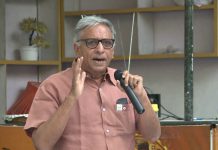M. Burhanuddin Qasmi
Recently, since the last two-three years, a new trend among some Muslims in Mumbai has been gaining popularity. How it came into practice and who first did or promoted it is not known. However, this was not the practice earlier, it is a new phenomenon and swiftly spreading.
In Mumbai city and its suburban district, BMC has already allotted very few places as Muslim graveyards (Qabristan). We do have little space for recreation grounds too. On the other hand, the population is increasing each passing day, so the deaths too. Existing greenery are being regularly corporated, take the case of greenland of Mumbai – Aarey Colony, for instance. Trees are being cut mercilessly and no agitation seems to be working to stop it.
It is recommended in Islam that a dead body must be respected as a living human. However, we cannot worship it nor we can keep it longer than usual duration as symbol of love and respect. Therefore, the use of extra chemicals or medicine in the coffin to decompose a corpse in the soil faster than the natural way in the grave is not recommended. Similarly, to do anything extra or to use any means to stop or create hindrance in the natural decomposition of the dead body is also not advisable in Islam.
This author has been to three graveyards in Mumbai during last one month to attend funerals of loved ones. It was noticed that this new trend is spreading like wildfire which may create a new concern for all existing graveyards in Mumbai. This needs serious and urgent attention from all, especially from the trusts which are managing the graveyards and BMC which is the original owner and caretaker of all public places in the city of Mumbai.
The heirs of a deceased person ought to be educated that what they are doing with the graves of their loved ones is of no use, neither religiously nor scientifically.
The photographs attached to this piece of writing are taken today (4 Nov. 2019). It was noticed that every four out of ten graves at a particular graveyard is covered with plastics in some or the other ways. Some are extremely heavy plastics used as tents for certain graves which will not be decomposed in soil in next 20-30 years, some may not be so, yet some other graves are decorated with plastic flowers and artificial feathers.
These all seem to protect the graves from rain or to express love and care by the living behind sons, daughters and relatives of departed souls.
The questions to honestly deliberate by the Muslims are:
Will these covering and decoration by any means, help the dead persons in their life hereafter in anyways? Are all these religiously required to be done by the heirs of a Muslim deceased? Plastic is ban in Maharashtra, how can we use it for anything? Aren’t we spoiling the earth and soil of our own graveyards by putting lot of plastics in them? How will we bury our upcoming dead ones after a few years or months in these same graves when plastic will slow down the process of decomposition of bodies under the soil? Why are we creating an environmental disorder by putting plastics over grounds which will also make the lives of ground insects difficult which are natural requirements for a graveyard to decompose dead bodies under the earth?
These are genuine concerns, I wish every Muslim needs to introspect individually and find wise answers. Plastic, an environmental hazard along with so many others, is a fact. This planet is ours and we need to protect it for our own succeeding generation. This issue requires public introspections on an individual level and civic body attention before it becomes yet another major civic issue for the city of Mumbai.
The Writer is an Islamic scholar, a graduate of Darul Uloom Deoband (World’s largest Islamic seminary and Editor at Eastern Crescent.

















